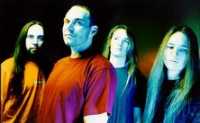In 1993, almost everyone thought that metal was history. Guitarist Jasun Tipton and bassist Troy Tipton, twin brothers from the San Francisco Bay Area, did not succumb to these prevailing doubts. They believed that even through the darkest hour, metal would live on, and they set about forming a band that would not only keep progressive metal in a place of honor, but would shatter the mold in the process. And so in creating Zero Hour, the brothers envisioned a dark, heavy, emotional vibe, expressed through intricate arrangements, forceful vocals, and meaningful lyrics.
Seven years of trials and triumphs later, Zero Hour is realizing the full extent of its potential through The Towers of Avarice, an ambitious concept work released through the well-respected Laser's Edge/Sensory label. The six-part epic, which combines the atmospheric drama of Fates Warning, the theatrical excitement of Queensryche, the challenging intricacies of Sprial Architect and Meshuggah, and fantasy prose that would make Dream Theater proud, is based upon the tale of a tower that in its insatiable appetite for energy sucks the very life out of humanity. A self-proclaimed savior arises, but can he save the world? The absorbing story is told start to finish, through "The Towers of Avarice," "The Subterranean," "Strategem," "Reflections," "Demise & Vestige," and "The Ghosts of Dawn." Produced by Dino Alden (Marty Friedman, Mordred, Imagika), the album has already drawn accolades from several major magazines in Europe and the United States.
The Towers of Avarice is Zero Hour's label debut, but it is the band's second full-length studio release. The self-financed Zero Hour CD established the group as a prog metal tour de force upon its issuance in 1998; an initial pressing of 2,000 units sold out quickly, leaving fans worldwide anxiously awaiting more Zero Hour material. The praises of the press flowed from around the globe, and the self-titled debut garnered raves from Flash (Italy), Snake Pit (Germany), Hard Roxx (UK), and many more. Michael Rensen of the premier German magazine Rock Hard proclaimed, "Zero Hour is one of the five Best Progressive Newcomers in the late '90s!" Now poised to rocket to the top of the prog metal heap, Zero Hour may appear to be an overnight sensation, but in fact it has taken years of hard work, struggle, and sticking it out through tough times to get to this point.
Even the very first task of assembling a lineup that not only would have the technical ability to carry out Troy and Jasun's musical vision, but would also embrace the band's unique philosophy and ideals, was not an easy one. While bringing drummer Mike Guy into the fold right in the beginning was a no-brainer since he was already close with the twin brothers, finding the right keyboard player and vocalist to complete the circle proved challenging. Vocalist Frank Mendez joined Zero Hour in 1995. He had already made a name for himself as the frontman of Rogue's Gallery, but saw the ZH opportunity as a chance to grow creatively.
Keyboard player Mike Conner (ex-Prodigy) also came on board, and together this solid lineup recorded the Discovery demo. Response to the five-song tape was overwhelming, and the band's following in the local club circuit was growing fast. But amid all this momentum, Zero Hour hit its first obstacle later that year. Mendez was feeling pressured by the band's demanding schedule and decided to leave. The remaining members knew they had to forge on and immediately began auditioning for a new vocalist. After trying out many singers and coming up dry, Mike Conner gave a tape to the vocalist of his own former band, Prodigy. The singer's name was Erik Rosvold.
Upon hearing what Zero Hour was doing, Erik knew he had to be a part of it -- and when the band heard a tape of what Erik could do, the feeling was definitely mutual. And so by early 1996, the lineup was again complete and Zero Hour began to play shows and write new material. Crafting eight new songs and polishing them to be studio-ready, Zero Hour prepared to record in 1997. But again, bad luck came their way. Because of the physical demands of playing progressive music, Mike Conner developed carpal tunnel syndrome in both hands. The keyboardist had no choice but to leave the group.
Still, the recording was not long delayed, as Zero Hour hired two accomplished players to record the keyboard tracks, namely Matt Guillony (Rush tribute, Dali's Dilemma) and Phillip Bennett (Starship, Enchant). Nothing would stand in the way of Zero Hour again. At Alden's Gate studio with engineer Dino Alden, the brilliant Zero Hour CD was recorded, and the band was on its way. The lineup has remained intact and stronger than ever before, as the band looks forward to supporting The Towers of Avarice throughout 2001
